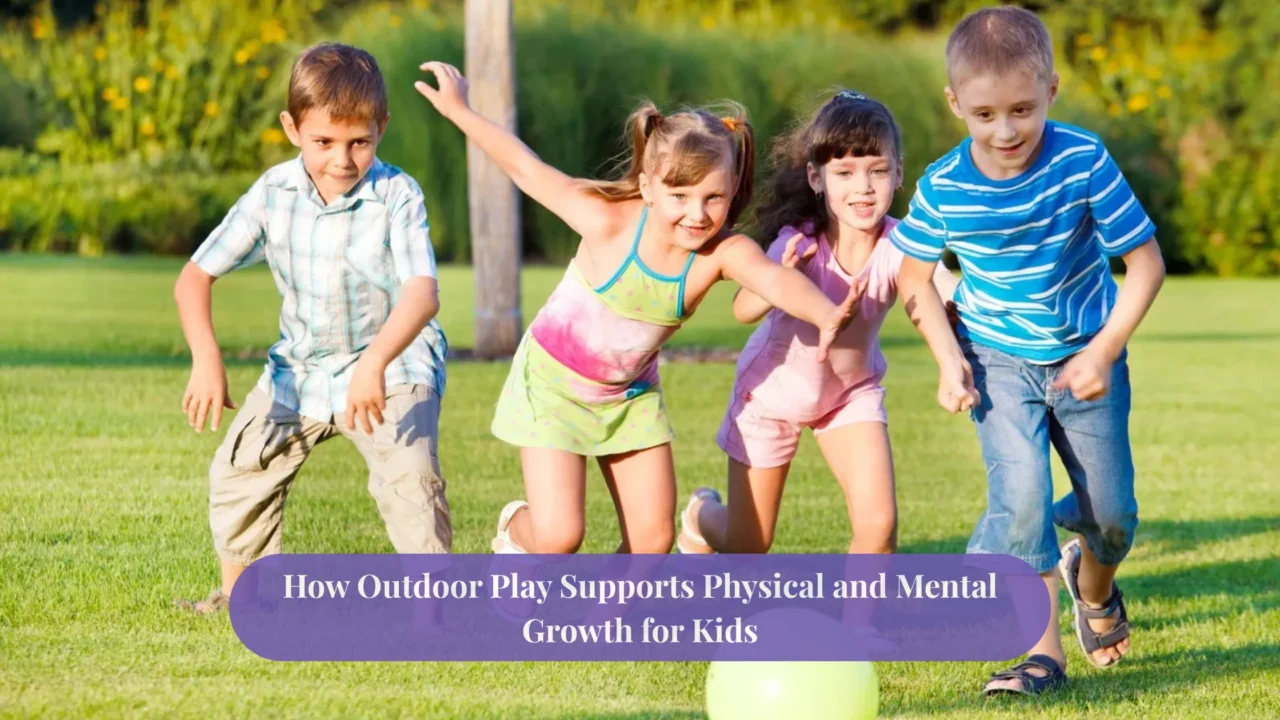In a world increasingly dominated by screens and indoor activities, it’s easy to overlook one of the most powerful tools for a child’s development outdoor play. Whether it’s a game of tag in the playground, building sandcastles, or simply running in open spaces, outdoor activities offer children an environment where they can move freely, explore nature, and build essential life skills.
More than just fun time, outdoor play supports both physical and mental growth, helping children thrive in ways that classroom learning alone cannot achieve. Let’s dive into the key benefits of outdoor play and understand why it should be a regular part of every child’s routine.
Physical Development: Building Strong Bodies
Children are naturally active, and outdoor play provides the space and freedom to use their energy in productive ways. Running, climbing, jumping, balancing these activities are not just enjoyable; they’re essential for developing coordination, muscle strength, and motor skills.
Unlike structured indoor activities, outdoor play allows children to move in dynamic, spontaneous ways. They learn how to balance on uneven ground, navigate playground equipment, and respond to changes in their environment. This kind of physical freedom is key to building strong, healthy bodies and preventing sedentary lifestyle-related issues later in life.
Outdoor environments also expose children to sunlight, which is crucial for Vitamin D production a vital nutrient for bone development and immune health.
Mental and Emotional Growth: Nature as a Nurturer
Beyond physical benefits, outdoor play has profound effects on a child’s mental well-being. Open spaces, fresh air, and the natural world offer a calming effect that reduces stress and anxiety, while encouraging curiosity and imagination.
Children who spend time outdoors are often more focused, calm, and emotionally balanced. Nature provides the perfect backdrop for developing mindfulness and emotional regulation—skills that are increasingly important in today’s overstimulated world.
Activities like digging in the dirt, watching insects, or collecting leaves give children a sense of wonder and connection to the environment. These quiet, unstructured moments support brain development and offer valuable time to develop impulse control in your child something that doesn’t come from rigid rules but from learning through real-life situations.
Social Skills and Teamwork
Outdoor play is a social playground. Children naturally form groups, create games, take turns, and resolve conflicts—all of which are foundational for social development. These interactions often happen more organically outside than in the classroom.
Negotiating the rules of a game, sharing space on a swing, or collaborating to build a fort are all situations where children learn to communicate, cooperate, and empathize with others. It’s also a great environment to practice leadership and problem-solving skills, especially in mixed-age groups where older kids guide the younger ones.
Creativity and Independence
Nature doesn’t come with instructions, and that’s a good thing. When children play outdoors, they create their own stories, invent their own games, and use natural materials in imaginative ways. A stick becomes a magic wand, a rock becomes a treasure, and a pile of leaves becomes a fort.
This kind of play is essential for developing creative thinking, resilience, and independence. Without the constraints of structured play or screen-based entertainment, children are free to explore and express themselves on their own terms.
Helping Children Cope with Emotions
When children feel overwhelmed, upset, or restless, stepping outdoors often brings a shift in mood. The sensory experiences of wind on their face, the sound of birds, or even the act of jumping into a puddle can help in comforting upset children. Outdoor play allows kids to release pent-up emotions in a healthy, physical way and regain their emotional balance through movement and discovery.
At many nurseries and preschools, teachers have started using outdoor time as a strategy to support emotional development. A walk in the garden, sandbox play, or time in nature corners are not rewards—they are necessities.
How Top Early Learning Centers Support Outdoor Play
Leading institutions like the best preschool in Abu Dhabi recognize that outdoor play isn’t a break from learning it is learning. They structure daily schedules to include safe, supervised, and enriching outdoor time that complements academic activities.
Whether it’s through nature walks, water play areas, or outdoor classrooms, these schools provide environments where children can grow holistically. The best preschool in MBZ integrates outdoor experiences into every stage of development be it toddler exploration or pre-kindergarten discovery ensuring that physical movement and mental stimulation go hand in hand.
Creating Balance at Home
Parents can support this growth by encouraging outdoor time at home. It doesn’t need to be a big park or fancy equipment even a short walk, gardening, or playtime on the balcony makes a difference. The goal is to give children a break from screens and a chance to move, breathe, and observe the world around them.
Allow your child to get messy, explore the unknown, and run wild sometimes. These moments are not only fun but are essential for learning boundaries, building resilience, and shaping their worldview.
Conclusion
Outdoor play is more than just a physical outlet it’s a cornerstone of childhood development. From building strong bodies to nurturing emotional intelligence, it offers a natural, joyful, and effective way to support growing minds and hearts. In both daycare settings and at home, it’s crucial to give children the time, space, and freedom to explore the world beyond walls.
By choosing an environment that values outdoor exploration, like the best preschool in Abu Dhabi you’re investing in your child’s complete growth. Let them run, laugh, fall, get up, and learn. Because in nature, every step is a step forward.




